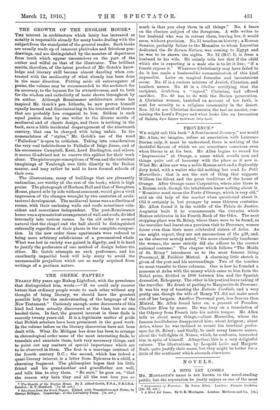PROVENCE.*
WE might call this book "A Sentimental Journey," nor would Mr. Allen, we imagine, refuse an association with Laurence Sterne, only, it must be understood, there is nothing of the doubtful flavour of which we are sometimes conscious even when Sterne is at his best. Mr. Allen begins to record his " Impressions " at Orange, a name which recalls men and things quite out of harmony with the place as it now is. What Mr. Allen saw was a noble Roman arch and a deplorably dirty hotel, with a waiter who did nothing but read Le Petit Marseillais ; that is not the sort of thing that suggests William the Silent and the great traditions of the house of Orange. After Orange came Carpentras, where also there is a Roman arch, though the inhabitants knew nothing about it. " Monsieur must mean the Porte d'Orange, which is very old," said an old lady of the market when questioned about it. Old it certainly is, but younger by some thirteen centuries. Mr. Allen found it in the middle of the Palais de Justice. Augustus built it to commemorate the victories which Horace celebrates in his Fourth Book of the Odes. The next stopping-place was St. Remy, where there were to be found, as the traveller had learnt on a previous visit to Provence, women fairer even than their more celebrated sisters of Arles. As one might expect, they are not unconscious of the gift, and, as the observer acutely noted, "the more classically handsome the woman, the more strictly did she adhere to the correct national costume." The chapter which follows " The Maids of St. Remy " introduces us to the most famous living Provencal, M. Frederic Mistral. A charming little sketch is given of the poet and his surroundings. Two of the touches we must transfer to these columns. One is how he founded a museum at Arles with the money which came to him from the Nobel prize, divided in 1906 between him and the Spanish dramatist, Echegaray. The other is his poetical leave-taking of the traveller. He drank at parting to Marguerite de Provence. It was his way of toasting the Entente Cordiale, and a very pretty one, though the wife of Henry VI. did not make much out of her bargain. Another Provencal poet, less famous than Mistral, Mr. Allen found later on, a peasant of Paradon, Charlour Rien by name. He was busy on a translation of the Odyssey from French into his native tongue. Mr. Allen tells us about many things,—about Marseilles, where the famous bouillabaisse disappointed him ; about Avignon ; about Arles, where he was inclined to recant his heretical prefer- ence for St. Remy; and finally, to omit many famous names, about the bull-fights of Nimes, which, he confesses, interested him in spite of himself. Altogether, this is a very delightful volume. The illustrations, by Leopold Lel6e and Marjorie Nash, quite justify their name, but they might be better for a little of the sentiment which abounds elsewhere.














































 Previous page
Previous page